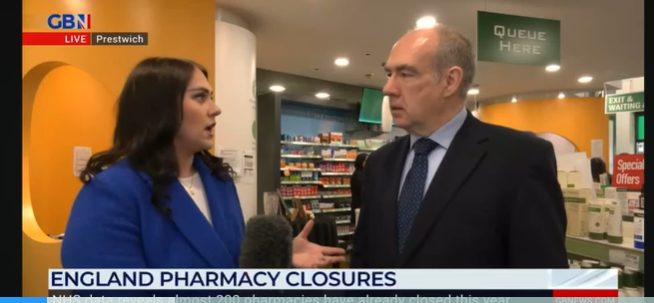Community Pharmacy England briefs MPs on medicines supply issues
Community Pharmacy England has been in Parliament today alongside patient representatives and others to highlight our ongoing concerns about medicines supply to MPs.
Medicines supply remains a critical issue for community pharmacies with disruption causing problems both accessing medicines and procuring them cost effectively.
In our recent sector polling, community pharmacy owners rated medicines supply instability as being the most severe pressure facing their businesses. This echoed the results of our Pressures Survey which found 97% of pharmacy owners survey are facing significant increases in wholesaler and medicine supply issues, with 71% saying this was leading to delays in prescriptions being issued.
We have today been explaining to MPs how the instability puts operational pressures on pharmacies, financial pressures on businesses, and for patients it means worrying delays.
During the Parliamentary drop-in event, which was held on Monday 11th July, we talked MPs through the issues and set out what we believe needs to happen to resolve them, calling for:
- Reform of Serious Shortage Protocols;
- Allowing generic substitution;
- An overhaul of the concessions system; and
- A strategic Government review of medicine supply and pricing with a shift to focusing on how to improve the functioning of the supply chain rather than solely on the drive to depress prices and margins.
You can read our briefing here:
At the event MPs heard from Community Pharmacy England representatives as well as pharmacy owners, and we were joined by representatives from the Nuffield Trust, Healthwatch England and from the Healthcare Distribution Association with whom we and others are working to agree on a set of principles to help pharmacies managing supply issues.
MPs attending were asked to help raise the issues in Parliament via questions or debates, or to visit a local community pharmacy during the summer recess period. We will also now share our briefing with a wider network of community pharmacy advocates across Parliament.
Anil Sharma, independent community pharmacy owner and Community Pharmacy England Regional Representative for the East of England region, said:
“Like all pharmacy businesses owners I am struggling to juggle medicines supply and pricing on a daily basis. As well as issues with obtaining some medicines, pricing is a constant worry – wondering whether we are going to be able to pay our wholesalers bills at the end of the month – and that’s all on top of managing the inevitable and understandable patient frustration and concern.
Government and the NHS need to take action to resolve this: it’s totally unacceptable that pharmacies are being asked to risk footing the bill for NHS medicines month after month, particularly when supply issues are not our fault and are completely out of our control. We have made this point loudly and clearly at today’s event and will continue to press for action.”
Janet Morrison, CEO of Community Pharmacy England, said:
“The instability in the medicines market is fast becoming the most critical issue facing community pharmacy owners and we hosted this event in Parliament to help MPs to understand this. Pharmacy teams are going above and beyond on a daily basis to mitigate these issues for their patients, and we are clear that pharmacy owners cannot continue to manage this issue on behalf of Government and to take huge financial risks as they do so.
We have set out a number of possible solutions to the issues but perhaps most fundamental is the need for a strategic review of medicines supply. Despite the billions of pounds in savings that pharmacy procurement brings, the margin that pharmacies are allowed to earn on medicines purchases has been capped at the same level for many years: this is yet another pressures at a time when pharmacy businesses are fighting for survival. We want to see a more balanced benefit-sharing approach and to a shift in focus away from the drive to depress prices and margins.”







